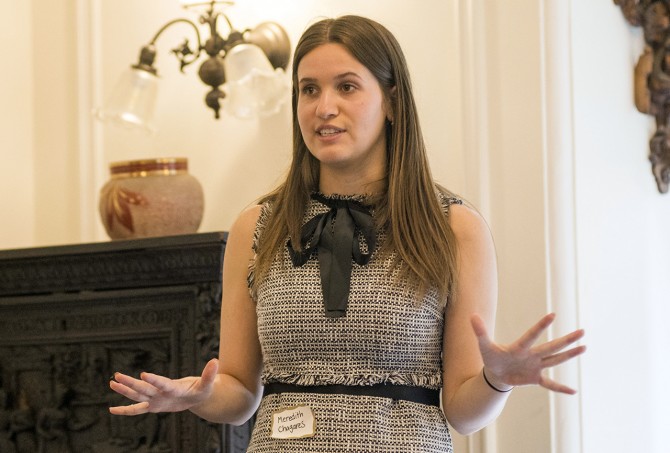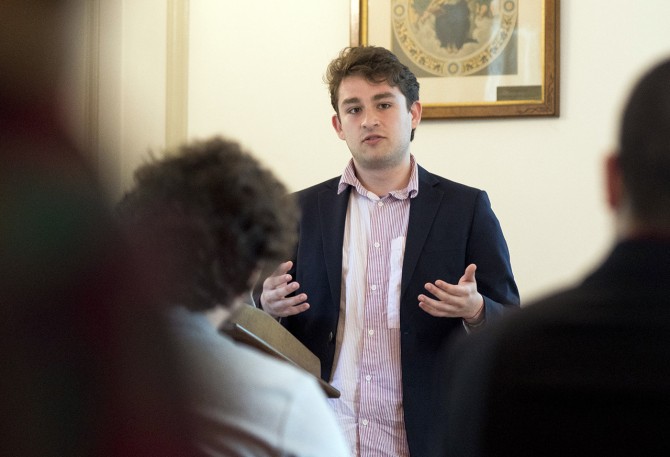Undergrad humanities scholars present their research
By Daniel Aloi
Meredith Chagares ’19 began her senior thesis in history, literally, with a footnote – one that led her to do investigative work for “Anatomy of a Cover-Up: How and Why the United States Covered Up Japanese World War II Biological Warfare Experiments.”
“I discovered about Japan’s experiments via a footnote while researching Nazi experiments,” she said.
Chagares was one of 28 undergraduate students sharing their research and thesis work at an all-day Humanities Scholars Conference, May 10 at the A.D. White House. Hosted by the Society for the Humanities, the public event was attended by faculty, graduate students, classmates, friends and family members. The short presentations were followed by a Q&A including faculty respondents.
Chagares’s sources included newspaper accounts and a 1994 book by historian Sheldon Harris that exposed Japan’s Unit 731 and other army units experimenting with human subjects, primarily Chinese civilians and captives, in the 1930s and ’40s. She submitted Freedom of Information Act requests for declassified documents, and did firsthand research in the National Archives.
The Japanese government and the U.S. both destroyed most of the documents on Unit 731 after the war. American officials kept “what the U.S. knew at the time” under wraps while developing their own biological weapons program, Chagares said.
The scholars at the conference, almost all of them graduating seniors, majored in government, history, classics, comparative literature, English, art history, music, Asian studies, philosophy, and feminist, gender and sexuality studies. Research topics included Vladimir Nabokov’s “Pale Fire;” practices of feminist and queer ethnography; the underground wine trade in Spanish colonial Argentina; Toni Morrison’s later novels; and an Etruscan urn at the Johnson Museum.
Asian studies major Alex Hutchins ’19 said his thesis, on nationhood and the development of nuclear power in Japan, began as a study of Japanese environmental activism. “In December I decided to change it … I wanted to go into Japanese modern history,” he said, including the 2011 Fukushima disaster. “More than anything, [this thesis] made me realize I need to go to grad school.”
In “Sonic Meditations,” music major Joshua Sadinsky ’19 explored the poetics of music and field recordings for his senior recital, pairing impressionist composers Debussy and Ravel with natural soundscapes he recorded on a backpacking trip in Olympic National Park.
He also composed a Cornell Chimes/piano duet for his recital in Barnes Hall. “The chimes were participatory, not interruptive – a surprise, particularly for those who didn’t pick up a program,” he said.
History major Rebecca Frank ’19 presented “The Afterlives of Karl Höcker: Private Photographs and the Reproduction of the Past.”
The first chapter of her thesis concerns the photo album compiled by SS officer Höcker while he was second in command at the Auschwitz concentration camp for eight months in 1944-45. Most of the 116 images depict collegial situations and military life in and around the camp: high-ranking Nazis including Josef Mengele; an officer leading a chorus of prisoners in song; Höcker with his dog; a hunting party.
Höcker returned to civilian life as a bank clerk and was tried and convicted of war crimes twice; he died in 2000. The album, in an American’s possession since 1945, was donated in 2006 to the United States Holocaust Memorial Museum, where Frank first saw it.
“The album really stuck with me, for what I thought I knew of the Holocaust,” Frank said. “The photographs drove every step of my research. These were his happy memories; these were his version of Auschwitz. We could each tell a totally different story about these images.”
The conference laid groundwork for a proposed Humanities Scholars Program in the College of Arts and Sciences, a new initiative envisioned to foster humanities scholarship and an intellectual community for cohorts of undergraduate students each year.
This fall, interested students across the university can enroll in SHUM 2750, Introduction to Humanities: Energy, a seminar that mirrors the 2019-2020 Society for the Humanities focal theme.
Paul Fleming, the society’s Taylor Family Director, said the new seminar will “introduce students to a ’big idea’ that cuts across many departments in the humanities, and offer multiple theoretical approaches for addressing that topic.” The seminar will feature guest presentations from Cornell faculty and Society Fellows, as well as visits to Cornell archives and special collections.
In its initial phase, the Humanities Scholars Program will provide a framework for advanced undergraduate research, similar to an honors track but including cross-disciplinary studies. Benefits for participating students in humanities majors or minors include career development opportunities, graduate student and faculty mentoring, and participation in an annual conference to present their capstone project. Interested students can inquire online.
Media Contact
Get Cornell news delivered right to your inbox.
Subscribe


